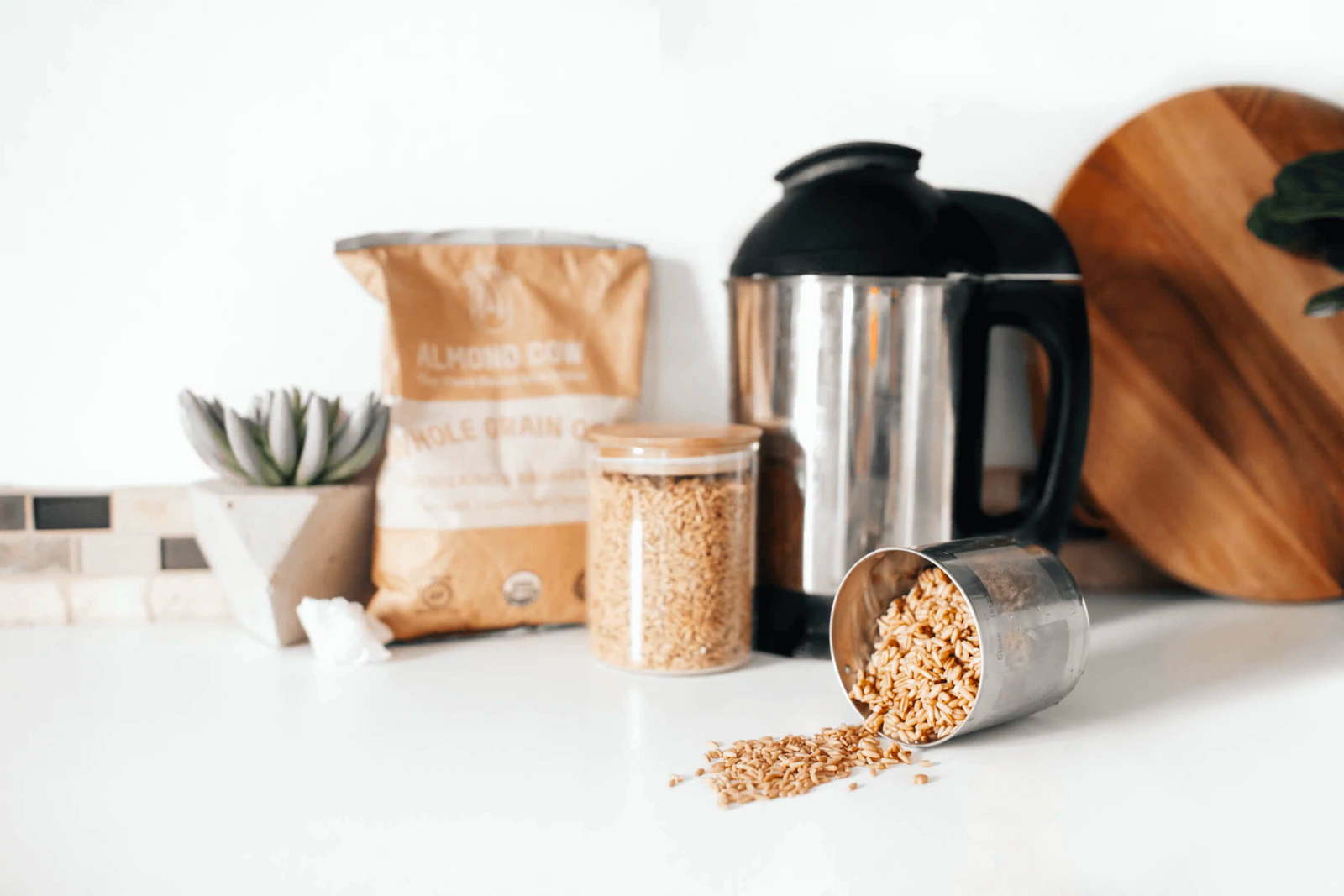
The Ultimate Guide to Making Oat Milk at Home | Homemade Bliss
4 Minutes
It seems like every other week, a new milk reigns supreme in the plant-based community. Here at Almond Cow, we love them all. However, one plant-based milk has taken the world by storm over the last few years – oat milk.
It’s the new “It” milk to anyone with a pulse. Nut-free. Sustainable. Healthy. What’s not to love about the simple oat, including its many cousins - rolled, whole grain, steel-cut?
So what exactly is oat milk? And why is it the center of attention at the moment? Our plant-based milk experts give you the scoop and answer commonly asked questions about oat milk.
Common Oat Milk Questions:
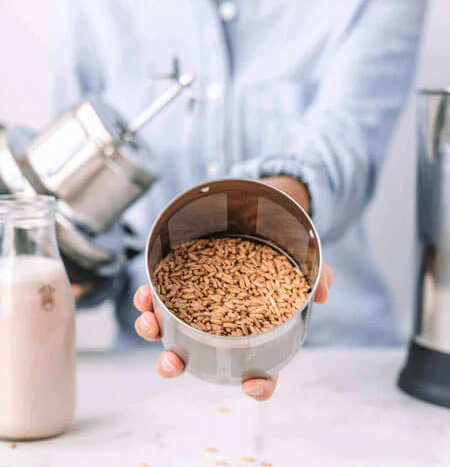
What is oat milk?
Oat milk is just like any other plant-based milk, when you get down to the nuts, seeds, or grains of it. Basically, it’s a plant-based milk made of oats and water. Often flavorings are added to the mix as well to enhance the natural sweetness and creaminess of the milk.
Most of our oat milk recipes use salt for freshness, maple syrup for a touch of sweetness, and a splash of walnut or avocado oil to add creaminess.
What are the benefits of oat milk?
Oat milk is an alternative to dairy and/or nut milk. It’s a wonderful option for those with nut allergies who can’t have the other alt-milks, like almond milk, out there.
Plus it’s naturally gluten-free if you’re using pure oats, like our whole grain oats. And it’s thicker than most other plant-based milks, so it often tastes much creamier.
Related recipe: Oat Pulp Pancakes
Is oat milk gluten-free?
Oat milk is naturally gluten-free. It’s made from oats, which contain no gluten. However, oats may be contaminated with gluten in production. If you want or need completely gluten-free oat milk, purchase certified gluten-free oats.
How many calories are in oat milk?
Oat milk tends to vary slightly calorie-wise, depending on the oats used. But regular oat milk has roughly 66 calories per 1 cup serving. There may also be some calories added if you include a sweetener of some kind of oil, as we do, for texture.
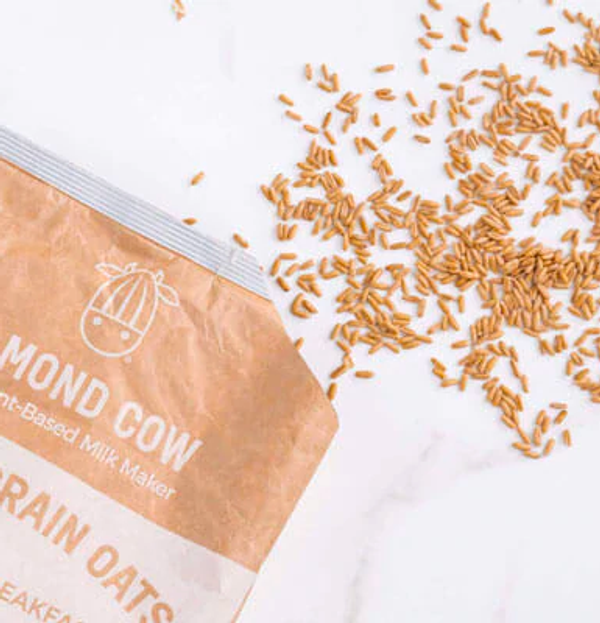
Is oat milk paleo?
No – oat milk is not paleo. The paleo diet does not allow for grains, and oats are a grain.
Is oat milk keto?
No – oat milk is not keto. Oats are a good source of natural carbohydrates and make a carb-rich milk. It typically contains about 15-20 gm of carbohydrate and 2-4 gm of fiber.
How much protein is in oat milk?
Oat milk contains around 2g of protein per 1 cup serving.
How much fat is in oat milk?
Oat milk is low in fat. Typically containing around 1-2g of fat per 1 cup serving.
How do you make oat milk at home?
Similar to other alt-milks, making oat milk at home typically involves blending the oats with water and then straining out the solids. The Almond Cow is the easiest way to make oat milk at home. You can create 40oz of oat milk at the touch of a button. Plus, you control what goes in your milk with a nut milk maker like Almond Cow. No preservatives, artificial flavors, or fillers are required.
What oats should you use to make oat milk?
The best oats we’ve found for making your own oat milk at home are whole grain oats. They’re the least processed, most natural form of oats. Plus, they make the perfect creamy oat milk.
Why Make Your Own Oat Milk Rather Than Buy In Store
With oat milk’s popularity on the rise, you can easily purchase a variety of oat milks at most grocery stores. But making oat milk at home is better for your wallet, your health, and the environment. Plus, you get to be creative and choose the ingredients.
Store-bought oat milk is often full of additives - texture additives (think canola oil and xanthan gum), artificial flavors, and preservatives with names too complicated to pronounce. With Almond Cow, you control what’s in your milk.
There are so many delicious treats you can make with the leftover oat pulp. Check out our amazing leftover pulp recipes like PB & J Oat Pulpmeal and Oatmeal Chocolate Chip Cookies.
Best of all, making oat milk with Almond Cow is more affordable than shelf milk. You can go to the store and pay $3.79 for a 64oz container of oat milk or make 40oz of oat milk at the touch of a button for just $0.55. Savings like that make homemade oat milk that much better.
Are there environmental benefits to choosing oat milk?
Alternative milks, in general, require less water and resources to make compared to dairy milk and oat milk is no different. In fact, it’s one of the best options for environmentally conscious drinkers.
Homemade oat milk is even more environmentally friendly. Just think about all those single-use plastic containers from store-bought brands. An Almond Cow in your home saves over 125 single-use plastic containers per year. That’s over 1000 plastic cartons every 10 years per household!
Imagine if a mere .01% of the US population did this - that’s over 43 million plastic cartons kept out of landfills and our already polluted ocean.
Oat Milk Nutrition Information
Depending on the oats you use at home, the nutritional values can vary. Natural ingredients are more likely to have variation than store-bought oat milks given the use of preservatives and flavorings.
Related recipe: Pancakes
One of the best things about Almond Cow is that you get to make oat milk, and any other healthy, nutritional milks in a convenient, budget-friendly way. Head over to our Recipes section to find our formula for the perfect oat milk, along with our other favorite plant-based milk recipes!
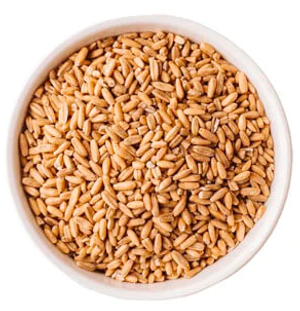
What are the different types of oats?
Whole Grain Oats / Groats
Oatmeal cook times: 45-60min
Best for: making oat milk, a hearty breakfast, long-term storage.
Whole grain oats, also known as oat groats, are the purest form of oat grains. They contain both an intact outer fiber layer as well as the seed of the grain itself. This means that they are a complete, unprocessed seed - this is the only variety of oat sold in stores that is capable of sprouting. All of the processing methods listed below remove that capability.
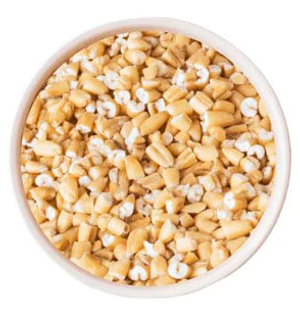
Steel Cut / Irish / Scottish Oats
Oatmeal cook times: 30-45min
Best for: making oat milk, a hearty breakfast.
Steel-cut oats are very similar to whole grain oats but for one key difference. They begin as whole grain oats but have been sliced so that the inner kernel is exposed. This is a purely mechanical form of processing that allows them to cook considerably faster than a whole grain oat.
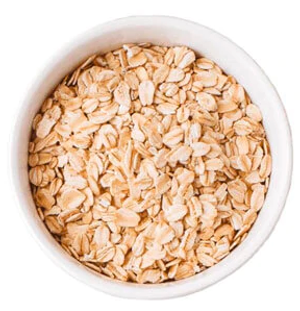
Rolled Oats
Oatmeal cook times: 15-30min
Best for: a quick breakfast, adding to recipes.
Rolled oats are the most familiar visual form of oats. They begin as whole grain oats, but are processed in two ways:
- First, they are heated at moderate heat to make them soft and faster to cook
- Once they are soft, they are flattened in rollers into the shape in the picture
The heat processing helps speed up the cooking time but makes these oats a bit slimy when used to make plant-based milk. additional processing increases the amount of oat surface that is exposed, which helps them absorb more water.
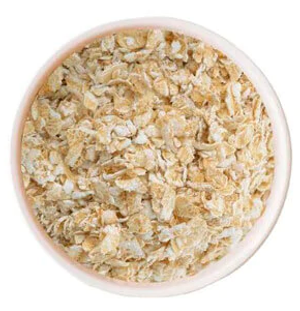
Instant / Quick Oats
Oatmeal cook times: 0-15min
Best for: a quick breakfast
Instant oats are the most processed form of oats and because of this tend to get a mushier texture than the above varieties. Milk made with instant oats will be the slimiest texture. They go through the following steps before packaging:
They are pre-cooked to make them faster to make into breakfast
They are rolled flat
They are crushed and pressed flatter than rolled oats to expose more surface, which helps them cook faster
